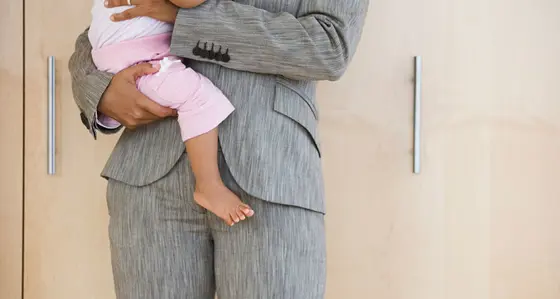
Hiring people, not profiles
5 min read 18 March 2024
My work self and my authentic self are very similar. And that’s one of the things I love about Baringa. The version of myself that I am professionally reflects well who I am as a human. This has allowed me to succeed, as well as develop strong friendships with my colleagues over the years.
But I suspect there are others who don’t feel they can be authentic at work. And I would like to understand why. It’s a question we need to ask, then dissect the answers and use them - to be better at what we do.
Here we’re aware of the value of diverse thinking and inclusive leadership, and we’ve come a long way on our equality journey. But we must keep challenging ourselves to be better. All the time.
A certain type of person
Interestingly, when I first moved to London from North Northumberland someone joked that I should lose my strong Northern accent. “It may be a bit career-limiting”. I don’t know whether it was, or is, but the comment did sow a seed in my mind that it mattered.
I was aware early on in my career that there were organisations with a certain ‘type’ of person, that I was not. There was a conformance regime, that I didn’t fit well with.
It never deeply affected me, but I was cognizant that I didn’t think in quite the same way as my private-school-red-brick-university-educated counterparts. I wasn’t central, I was a bit of an outlier. With my rural background I felt, at work, like a minority for the first time. I wasn’t ‘normal’ in that environment. Whatever normal is.
Diversity – in a ‘non-obvious’ way
However, I was also a straight, white bloke who drinks beer and plays sport – so I wasn’t entirely outside of the mould, either. And this has given me strong principles about diversity in a non-obvious way.
Being aware of diversity of thought is something that has evolved at Baringa over the years. And I’ve become more and more conscious of trying to drive teams of people who are the antithesis of group think. You start to really appreciate the benefits of unique identities, experiences and backgrounds.
Hiring people, not profiles
When we first ran our graduate scheme at Baringa we only recruited from three universities. Guess what? They happened to be the universities that our partners had been to! I certainly wouldn’t have got a job with those limiting parameters.
When I was more junior at Baringa, it was my responsibility to review CVs. I’d look at the degree and institution; it had to be a 2:1 from a reputable university. I still review CVs now, but I can’t remember the last time I looked at grades and institutions.
We’re not hiring the person on the CV anymore; we’re hiring the individual behind the CV. We’re thinking, “That’s an intriguing profile – I’d like to meet that person”. And that’s definitely a big change from where we were.
Deactivating the code
We were very much a group-think organisation, and for a long time, we unconsciously hired people who looked like us. It was just a certain profile of person, and we tended to employ gregarious extroverts. Without doubt, we’ve become a lot fairer, and we now understand personality profiles better.
But we can still work harder regarding social mobility; bringing in people who can’t afford to go to university or have been brought up in inner city schools. There’s always more we can do to create an accessible environment where more candidates from all backgrounds can thrive.
We need to keep asking the difficult questions and keep measuring everything we can. Knowledge is power – and it fuels us to never stop progressing.
Personally, I need be curious and understand what my team needs. I will continue to ask: how can we make our colleagues feel comfortable enough to bring their uncoded selves to work?
More from this series

Supporting different versions of our authentic selves
Parris Lougheed, Executive Assistant, describes her journey as a Black woman discovering the code and finding support throughout Baringa. She believes that rewriting the code must be authentic and allow us to bring our everchanging true selves to work. Parris recently became a parent, and this means discovering a new code, and a new version of her working self.
Read more
Dancing with the code
Sam Bennett, Knowledge Management Advisor, shares exactly what it means to recognise and work within the code. After suffering from imposter syndrome before even starting at Baringa, Sam describes how they were able to become more them at work, how Baringa supported them, and how change now needs to come from the wider industry.
Read more
Wonder Woman doesn’t exist…
Olena Isaieva is happy to admit she is no Wonder Woman. It’s not possible to do everything by yourself, and you shouldn’t try. Our Director in Commodities and Energy Trading in Switzerland credits a strong support system with the success and fulfilment she enjoys, both in her personal life and career. Read on to find out how she is using her own experiences as a woman in male-dominated environments, to support and encourage others at Baringa.
Read more
Freeing the chameleon
From the covert world of law enforcement and intelligence to time in consulting firms big and small, James Hampshire has done his fair share of shape-shifting to fit in. However, following a revelatory diagnosis, James explains how it was time to let go of the mask and reveal his true self.
Read moreRead our Personal Journeys blog

Diversity and inclusion: personal journeys
A series of reflective pieces where brilliant people from within Baringa will share their journeys as individuals or members of our company and community.
Read more


Why I am talking to white people about race
Introducing Jennifer Cook, an expert in organisational and operational transformation and a leader in Baringa’s Ethnic Diversity Network
Read moreIs digital and AI delivering what your business needs?
Digital and AI can solve your toughest challenges and elevate your business performance. But success isn’t always straightforward. Where can you unlock opportunity? And what does it take to set the foundation for lasting success?